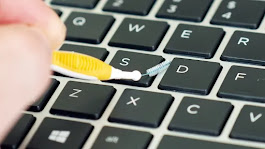Regular cleaning allows for a long-lasting PC without defects caused by dirt. Here you can find out what needs to be considered and how you can clean your PC.
Why Should You Clean Your PC?
In most cases, the PC is used daily, so it is always exposed to a certain load. In addition, the housing has an open design so that the air circulation inside can cool the components. The fans not only draw in cold air, but also dust and other particles. These gradually become attached to the components.
Heavy contamination of the PC can cause performance problems. Dust gradually settles on the rotor blades of the fans, sometimes also in the entire housing. In the long run, this damages the components and, in the worst case, can lead to defects. That's why cleaning your PC is so important. Depending on use, location and type of construction, the period can vary, but twice a year is definitely worth it, if not more often.
Cleaning The PC Cleaning Aids
Cleaning your own PC isn't always easy, especially when you're doing it for the first time. You're probably afraid of breaking something if you mess around with the components yourself. But you should not be afraid here, because there are various tools that you can use when cleaning and that make it easier for you to handle your computer properly.
Vacuum Cleaner
A regular vacuum is fine for a rough clean, but a handheld vacuum is even better. This can be used to remove coarse dust, preferably with a thin and flat nozzle that can be run over the front fan and the fan on the power supply. You should only vacuum other components from a distance, but never approach them directly with the vacuum cleaner. A brush attachment can also be worthwhile, or a vacuum cleaner with a blow function at the same time.
Compressed Air Spray
A regular vacuum is fine for a rough clean, but a handheld vacuum is even better. This can be used to remove coarse dust, preferably with a thin and flat nozzle that can be run over the front fan and the fan on the power supply. You should only vacuum other components from a distance, but never approach them directly with the vacuum cleaner. A brush attachment can also be worthwhile, or a vacuum cleaner with a blow function at the same time.
Compressed Air Spray
Compressed air spray is even better here. This has been specially developed to blow dust out of small corners. Compressed air in a can can be bought in stores or online and can be used in a variety of situations, including cleaning your own PC. Most cans offer a short and a long attachment that can be used to spray into the smallest corners of the computer. So you can remove dust everywhere, but don't mess around with a big vacuum cleaner.
Brushes And Brushes
Brushes and brushes are also suitable for removing further deposits. The bristles should not be too coarse so that the surface of the components is not damaged. However, these tools are perfect for getting into small cracks and cleaning the dust from fans and other components. A toothbrush can also help here.
What should you pay particular attention to when cleaning your PC?
Even if it seems difficult at first, you can't go wrong if you use your PC properly. However, there are some small things to watch out for. For example, don't always spin the fans when cleaning them with a can of compressed air. This can lead to a defect. Better hold the rotors or otherwise fix them when blowing through the fans.Also, avoid cleaning products that use moisture or static electricity in any way. Cleaning with water or a classic feather duster is not recommended here. This can also lead to problems and subsequent short circuits in the device.
Dust filters can also help prevent the components of the PC from getting dirty too quickly. These are sometimes already included with a computer and can be stretched in front of the fans. Otherwise, you can also buy them later and install them.
Conclusion
Cleaning your own PC helps to prevent problems and promotes the longevity of the individual components. A thorough cleaning should be done twice a year, or four times if used heavily. Fans and other components should be kept away from the dust they attract through cooling. Aids, such as compressed air cans, are indispensable for such a cleaning and help to get into the smallest corners.


Comments
Post a Comment